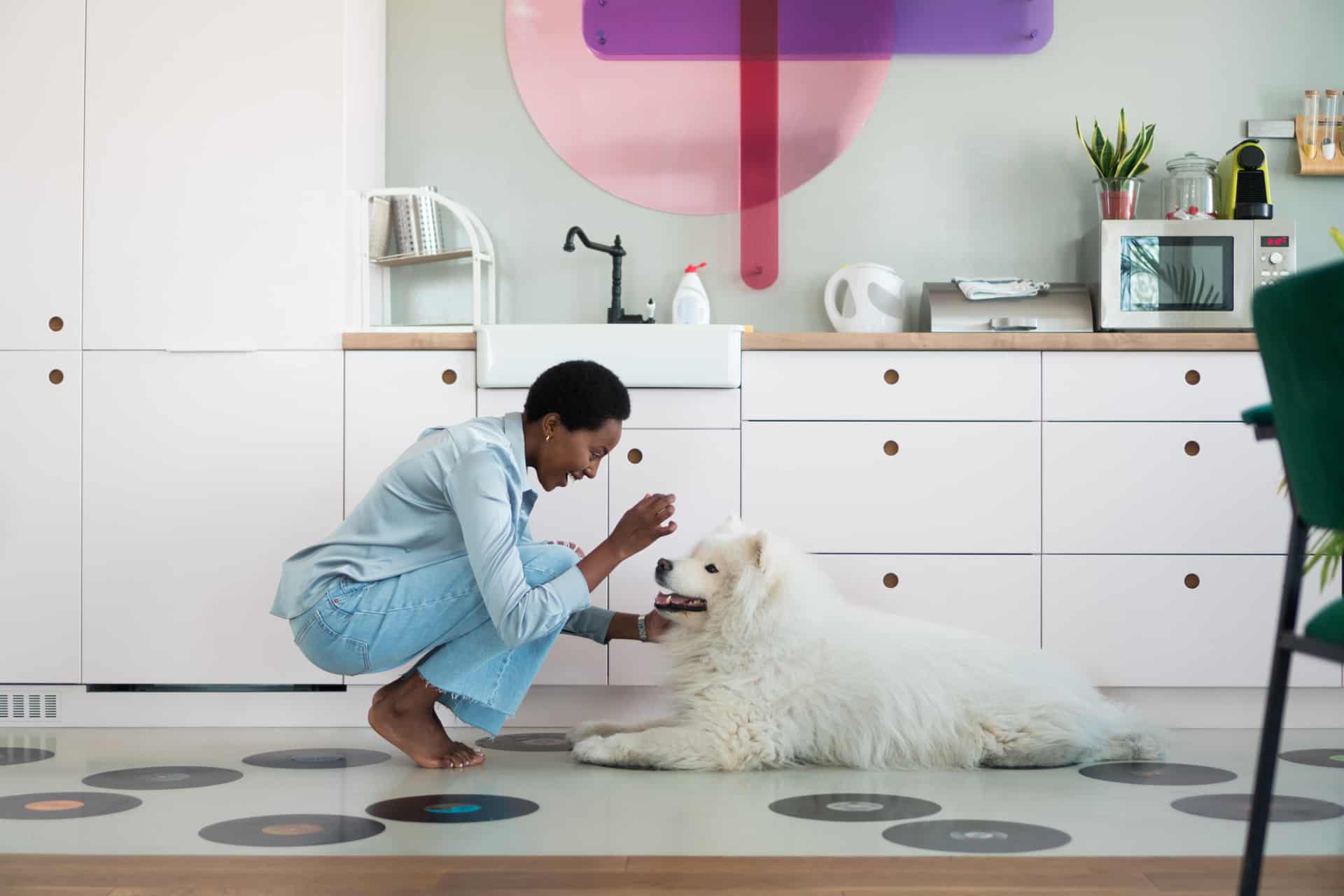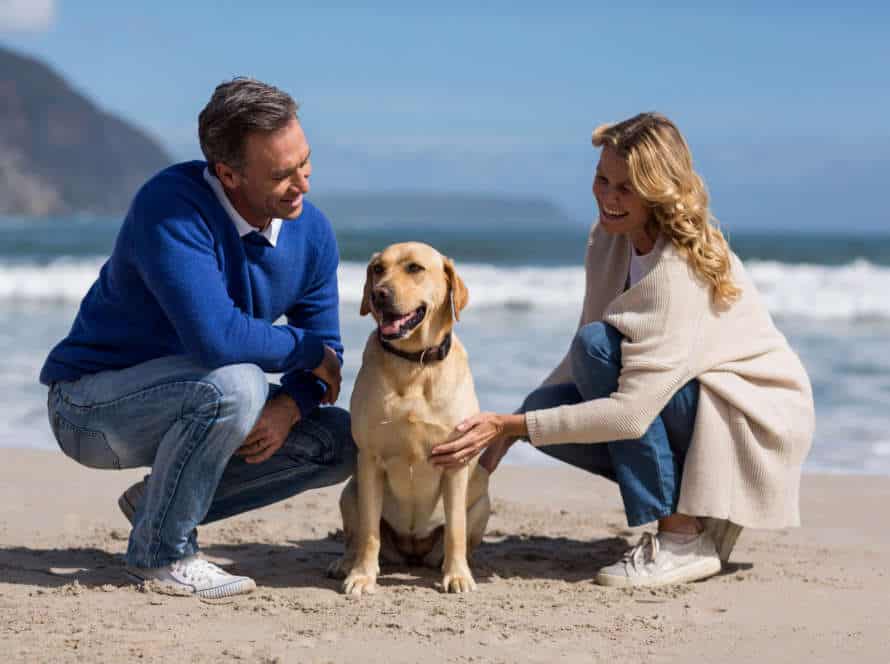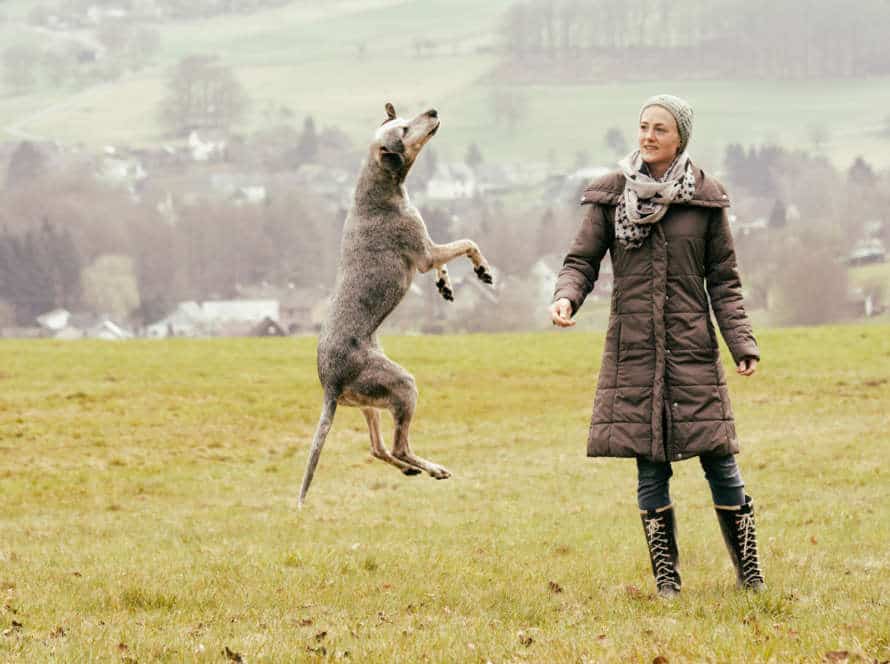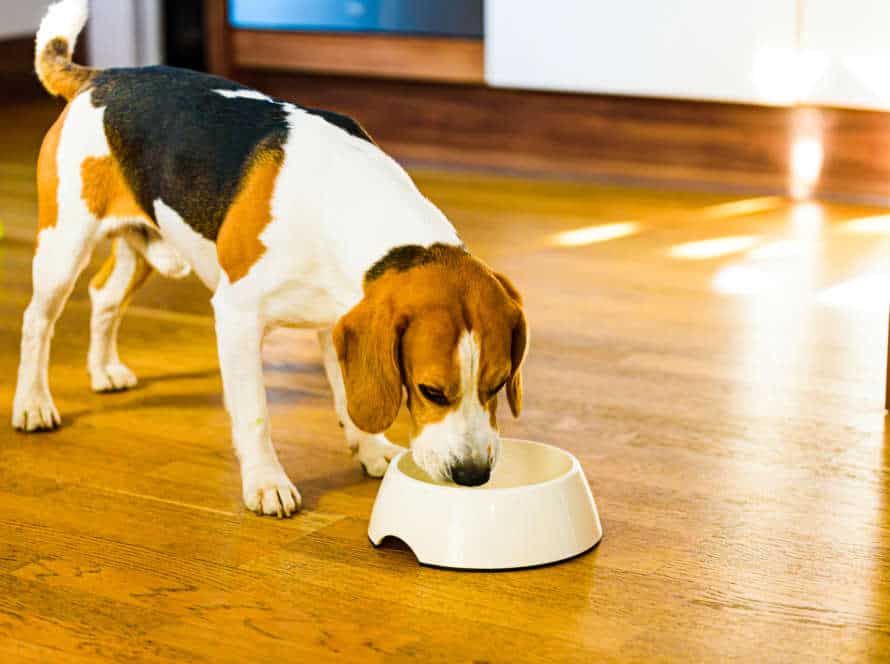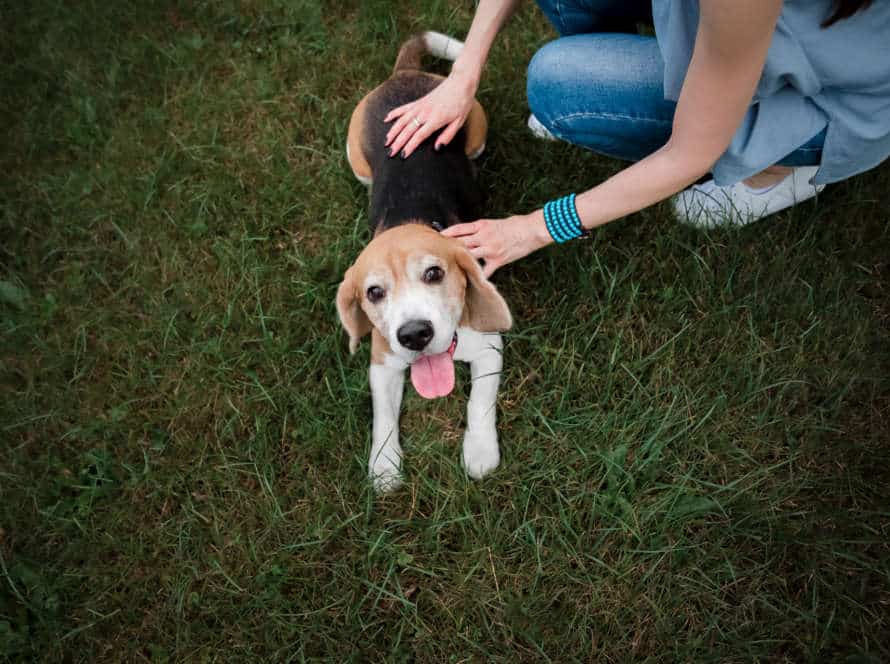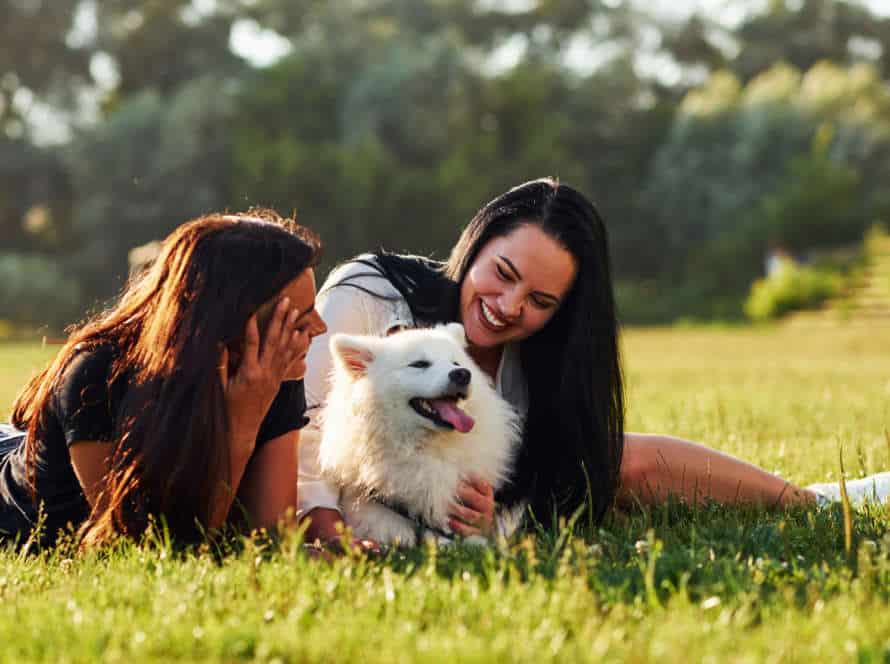Trust-Building Strategies for Adult Dogs: Strengthen Your Bond
To gain trust from your adult pup, there are multiple strategies you can use. Here are four of them:
- Exercise Regularly: Show your dog you care for them by exercising with them often.
- Positive Reinforcement Training: Reward good behaviour with treats, praise or toys, and redirect bad behaviour.
- Active Listening: Pay attention to them and understand their communication signals.
- Respectful Physical Contact: Touch and groom your dog gently. Respect their personal space and avoid rough handling.
These strategies will help you build trust and a strong bond with your adult pooch.
Understanding Your Dog’s Communication
You’ve just adopted an adult dog? Awesome! To build trust with them, you’ll need to understand their communication. How do they express themselves and their needs? Let’s explore ways to create a meaningful connection between you and your pup. Here’s how to foster that trust.
Reading your dog’s body language
Grasping your pup’s body talk is a must for understanding their communication. Here are the main signals to watch for:
- Ears – If pricked up, they’re interested or alert. But if flattened, they might be scared or anxious.
- Tail – A wagging tail can mean joy or enthusiasm. Low or tucked suggests fear or submission.
- Eyes – Dilated pupils signal fear or excitement. Narrowed pupils imply aggression or stress.
- Body posture – Loose and relaxed body? They’re content or happy. Stiff or tense body? Fear or aggression.
By studying your pup’s body language, you’ll comprehend their needs and emotions better. Plus, you’ll have a stronger bond with your furry buddy!
Signs of fear or anxiety
It is key to grasp your pup’s expression. Here are some signs that your pup may be nervous or distressed:
- Excessive licking, yawning or panting.
- Shivering, quivering or pacing.
- Tail tucked or ears laid back.
- Destructive behavior or hiding.
- Aggressive behavior such as growling or barking.
If you spot any of these indications, try to figure out the cause of the anxiety and remove it if possible.
Offering a secure place for your pup, introducing them to other dogs and people, and using positive reinforcement training can help your pup trust you and overcome their worries. Bear in mind that establishing trust and providing a positive atmosphere is critical to strengthening the connection with your furry friend.
Signs of contentment and happiness
As a pup’s parent, it’s essential to know when your furry pal is in a good mood. There are some signs that show your doggo is happy. Here are two of them:
- Waggy tail: This is an obvious sign that your pooch is content. The tail will be up, and it’ll be wagging back and forth in a calm way.
- Relaxed body language: When your dog is happy, there won’t be any signs of stress or tension. Their ears will be in a normal position, their body will be loose, and they might even make happy noises like sighs or groans.
Observing these signs of joy and satisfaction can help you create a deeper bond with your doggo and make sure they have an amazing life.
Listening to your dog’s vocalizations
Dogs talk to us with many different vocalizations. It’s important to know each one to have a strong bond. Here are some examples:
- Barking: Dogs bark for lots of reasons. Like to tell you about danger or strangers, their needs, or feelings of excitement or anger. Too much barking can mean stress or worry.
- Growling: Growling can show aggression or joy, based on the situation. Watch out if it comes with other aggressive signs.
- Whimpering and whining: This can mean pain, hunger, or fear. You should check on your dog and give help or medical care.
- Howling: This is a way to mark their area or find friends. It could also be a reaction to strange noises.
Figuring out your dog’s vocalizations will help you two be closer. And your pup will learn to trust and rely on you.
Different types of barks and what they mean
Dogs bark in different ways. These barks tell us their needs, emotions and boundaries. Knowing these barks can help strengthen ties with our pooch and improve communication.
Alert bark: Short and sharp. It means your dog noticed something strange.
Playful bark: High-pitched with tail wagging and bouncing. Your dog is in a playful mood and wants to interact with you.
Growling bark: Low and guttural. Often, a sign of anxiety, aggression or territorialism. Your dog may be telling you to back off or there’s a threat.
Whimpering bark: High-pitched, mournful bark. Your dog needs attention or comfort.
By recognizing and responding to your pup’s barks, you can create a strong bond and a more satisfying relationship.
Understanding growling and other vocalizations
Growling is one way dogs talk to owners or other dogs. Knowing what your dog’s growls mean is a great way to strengthen your bond and avoid aggressive behavior.
Common growls and their meanings:
- Low-pitched growls: Anxiety, fear, or pain.
- High-pitched whines and yelps: Excitement, attention, or discomfort.
- Grunt and moans: Happiness or contentment, plus wagging tails and positive body language.
When responding to your dog’s vocalizations, pay attention to body language. React calmly and positively. This will help you understand your pup’s communication.
Positive Reinforcement Training
Positive reinforcement training is a great way to build trust between humans and animals. It involves offering rewards for desirable behaviors. This is one of the most popular and effective training strategies for adult dogs. With this method, they learn to trust their owners, and get more involved with activities.
Here’s a breakdown of the basics of positive reinforcement training. Learn how to use it and strengthen your bond with your adult dog.
Using treats and praise to build trust
Positive reinforcement training is a great way to build trust with your adult pooch! Give treats and praise when they show positive behavior. It’s important to remain consistent in your training methods and be patient with them. Put in time and effort to connect with your dog daily. Games, walks, belly rubs – these are all great activities to do together. Building trust takes time and patience. Stick with positive reinforcement techniques and spend quality time with your furry friend – this can help to strengthen your bond and deepen your relationship.
Consistency and repetition in training
Consistency and repetition are must-haves for positive reinforcement training and trust-building strategies with adult dogs. By setting up a routine of rewards, commands, and positive behaviors, you can create a strong connection with your pup and be successful in their training. Here’s a few tips to consider:
- Set clear commands for your dog and use them often.
- Be consistent with the rewards you give your pup – whether it’s treats, toys, or praise for good behavior.
- Repeat commands and behaviors until your pup responds correctly each time.
- Train regularly in short sessions, not long intervals. This will keep your dog interested and focused.
Pro Tip: Be patient and upbeat throughout the process. Dogs respond best to positive reinforcement and consistency. Focus on building trust and a strong bond with your pup!
Using training as a bonding experience
Train your grown pup with positive reinforcement to create a strong relationship. Reward good behavior with treats or praise and don’t punish. Give it a go! Start simple. Commands like ‘sit‘, ‘stay‘ or ‘come‘. Use small, yummy treats as rewards. Praise and give fuss when they get it right. Be consistent with your training. No scolding or physical punishment. Move on to more complex tasks to deepen your bond. Positive reinforcement will bring you closer and create a happier and better behaved pet.
Playtime and Exercise
Playing with your adult dog? What a great way to build trust and strengthen the bond. It’s not only great for mental and physical stimulation, but it’s also a sign that you are the leader. Exercise has many benefits, like enriching your relationship with your pup.
Let’s explore how playtime and exercise can help build trust and strengthen the bond with your adult dog.
Importance of daily exercise for dogs
Exercise for your dog each day is essential for their physical and mental health. It keeps them fit, reduces stress, and strengthens their relationship with you. Here are a few reasons why daily exercise is important:
- Physical Health: Exercise helps maintain a healthy body weight and can reduce the risk of diabetes, arthritis, and other illnesses.
- Mental Health: Exercise lowers stress and anxiety, increases good moods, and decreases destructive behaviors like chewing and digging.
- Bonding: Going for a walk or playing fetch gives you and your pup the chance to create trust and form a strong connection.
To sum it up, regular exercise is key in keeping your dog happy, healthy, and well-behaved. Pro Tip: Try puzzles, obedience and agility training to keep them mentally and physically challenged.
Choosing the right activities for your dog’s breed and energy level
Choosing the right activities for your pooch is key to keeping them healthy and developing a strong bond. Different breeds have varied energy needs and tendencies, so you need to tailor playtime and exercise to your pup’s particular needs. Here are some tips:
- High-energy breeds like border collies or huskies require running, hiking, and more advanced exercises.
- Smaller or low-energy breeds like basset hounds or bulldogs do better with short walks, indoor games, and training drills.
- Interactive games like tug-of-war, fetch, and hide-and-seek are great for bonding and stimulating your dog’s mind and body.
- Don’t forget to experiment with different activities and routines to see what works best!
Incorporating playtime into training and bonding
Incorporate playtime into training and bonding! It’s a great way to build trust with your adult pup. Reward successful obedience with games like tug of war or fetch. This encourages camaraderie between you and your dog.
Involve them in physical activities like hiking, rolling in the grass, or belly rubs. This helps to deepen the bond between you two.
Remember, not all play is suitable for all dogs. Games like tug of war are not suitable for aggressive or dominant dogs. Understand your pup’s energy levels and find games that are stimulating, but not too overstimulating.
Socialization
Socialization is key for binding humans and pooches. Grown-up doggos need socializing too! It builds trust and creates an atmosphere of ease. It also helps dogs to be more accepting of different environments, persons, and animals. Here are some ways to socialize adult dogs and build a bond of trust:
Exposing your dog to new people, animals, and experiences
To build trust with your adult dog, it’s important to introduce them to new people, animals, and situations. Here are some tips:
- Start gradually. Use treats and praise to show your pup that new experiences can be good.
- Motivate positive interactions. Reward your dog when they are nice to people and animals. Avoid situations that make them scared or angry.
- Provide a safe place. Give your dog a place to relax when they feel anxious.
- Be patient. Building trust takes time and effort. Don’t rush your pup.
- Get help. If your pup is struggling, talk to a professional trainer or behaviorist.
Pro tip: Socializing your dog leads to a stronger relationship and a healthier life.
Gradual introductions to new situations and environments
Introduce adult dogs to new situations and environments gradually. Small doses are key!
Reward calm behavior with tasty treats and praise.
Let pup observe from a safe distance. No pressure.
Bring familiar items like toys, blankets, etc. for comfort.
Be patient. Give pup time and patience to adjust.
Every dog is different. Tailor introductions to individual personalities and experiences.
Positive reinforcement for good behavior during socialization
Positive reinforcement is a great way to encourage good behavior and make your bond with your adult pup stronger. Here are some tips to try:
- Treats: Give your pooch a treat when they act friendly to new people or animals. This will help create positive connections with new experiences.
- Praise: Verbal praise like “good boy” or “good girl” encourages your pup to repeat the good behavior.
- Toys: Reward your pup with a toy after they’ve interacted well with another pup or person.
- Breaks: Take regular breaks during socialization so your pup can rest and relax. This will help avoid over-stimulation and lessen the chance of your pup being anxious or stressed.
By using positive reinforcement, you can trust and build your relationship with your adult pup while helping them behave better in social situations. Pro Tip: Be consistent and patient with training and reward your pup for the good behavior.
Establishing Boundaries and Routines
Create a strong bond with your adult pup by understanding the significance of boundaries and routines. Both components are key for building trust. They will help your pooch know their place at home and keep them safe. Boundaries and routines also give your doggo a feeling of safety and structure. Let’s find out how to incorporate these techniques.
Setting boundaries for behavior and interactions
Creating boundaries and routines is vital for constructing trust and strengthening the connection between you and your adult dog. Here are some techniques to assist you in building limits for behaviors and interactions:
- Be steady – Dogs flourish with habits and structure. Remain consistent with your demands, regulations, and routines to help your pup feel safe and secure.
- Employ positive reinforcement – Reward excellent behavior with treats, compliments, and love. Positive reinforcement is an effective way to motivate your dog to repeat desirable activities.
- Form physical boundaries – Utilize baby gates, obstructions, or cages to specify physical boundaries for your dog. Allocate certain spots for dining, sleeping, and playing.
- Keep composed and confident – Dogs react best to composed, confident leadership. Stay away from shouting, punishment, or physical force, as it can hurt the trust and bond you have with your pup.
By establishing boundaries and routines, you can generate a secure and caring atmosphere for you and your furry companion to live and progress together.
Consistency in feeding and exercise routines
Create a steady feeding and exercise routine with your adult dog to form a trusting bond. Feed the same food, in the same amount each time. Plus, have regular exercise, like walks, runs, or playtime for physical and mental stimulation. With consistency, you can set clear boundaries and expectations, helping reduce anxious or fearful behaviors. It can also reinforce good habits and make your pup happier, healthier and more balanced.
Pro Tip: Dogs love routine, so make sure you stick to it to keep them safe and secure.
Establishing a sense of predictability and stability for your dog
Creating trust and a strong relationship with your adult dog is key. Here are some strategies to make that happen:
- Set boundaries: Make it clear what your pup can and can’t do. No jumping, barking, or begging at the table. Be consistent in the rules and enforce them.
- Create routines: Make a plan for meals, fun, walks, and sleep. Dogs love predictability and routines will help reduce stress.
- Be consistent: Use the same commands and body language when talking to your pup. This will help them understand what’s expected of them and trust you more.
- Reward behavior: Give treats, verbal praise, and love when your pup does something good. This will help the bond between you and encourage good behavior.
Frequently Asked Questions
Q: How can I build trust with my adult dog?
A: The best way to build trust with your adult dog is to spend quality time together, offer positive reinforcement in the form of treats and praise, and be consistent with training and rules.
Q: Can I still build trust with my adult dog if they have had a rough past?
A: Yes, it may take more patience and consistency, but adult dogs can still learn to trust and bond with their owners through positive reinforcement and a calming, stable environment.
Q: Should I punish my adult dog if they make a mistake?
A: Punishment can actually harm trust-building efforts with your adult dog. Instead, redirect their behavior and offer positive reinforcement for good behavior.
Q: How long does it take to build trust with an adult dog?
A: Building trust with an adult dog can vary based on their individual personality and past experiences. Consistency and patience are key, but it is possible to see progress within a few weeks to several months.
Q: Can trust-building strategies help with behavior issues in adult dogs?
A: Yes, trust-building strategies can help address behavior issues in adult dogs by improving their overall sense of security and trust in their owner, leading to better behavior and response to training.

